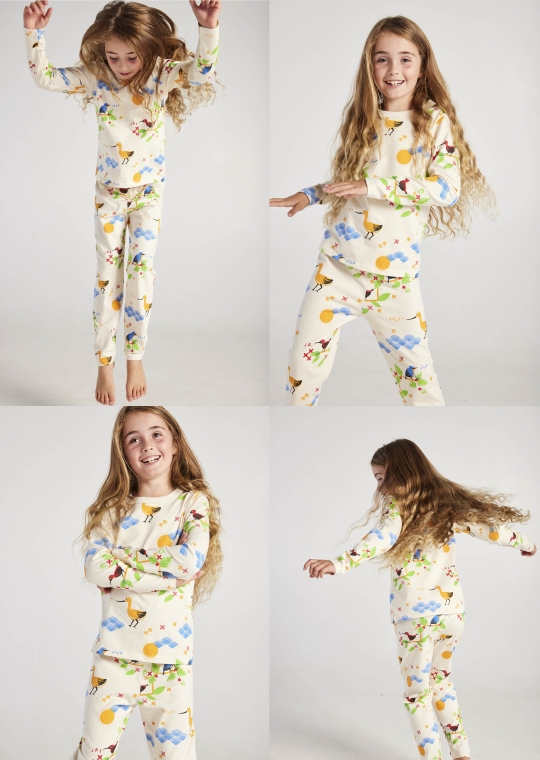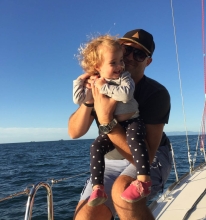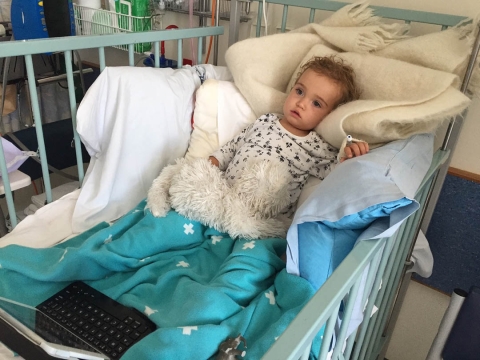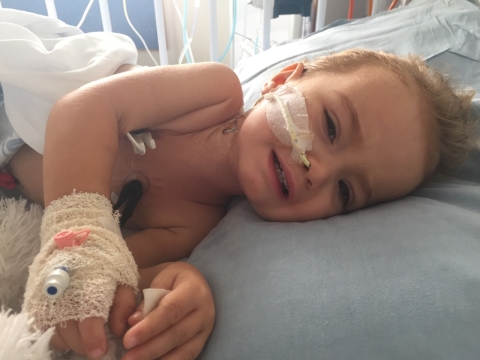
Meet the Kids: Lucca Holecliffe
Lucca was a wonderfully happy and alert little baby. The pregnancy/childbirth/early babyhood is such a stressful time in terms of concern for the baby’s health and safety, when they grow past that stage you breathe a sort of sigh of relief - which meant we were totally unprepared for what came next. She was about 16 months old, and was becoming really difficult to settle - we thought all the normal things (teething etc), but she also had a quite a round tummy (again quite normal for babies). We can’t really remember a definite point where we knew something was wrong, but whatever it was, we took her to see our doctor, who could tell something was not quite right.
Initially suspected to be a twisted bowl, some scans at hospital later, we were told there was a ‘mass’, and that this would be the 'beginning of a long journey'. In retrospect, it was completely accurate, but not the news you want to hear, or are able to really comprehend.
So after this news at 4am after a very long night we were put in a room full of crying babies and sleeping parents, awaiting the next step.
The diagnosis
The next steps were really scary for us - more scans, and a biopsy, and lots of uncertainty (from us, but also the medical team). We were told about the different types of child cancers, benign and malignant, but how this mass wasn’t really ‘presenting’ as typical of any of them. It seemed to take forever, and Lucca suddenly started declining rapidly. We were panicking, feeling like we’d been forgotten, just wishing they could start some treatment, any treatment - but understanding that you can’t treat something without knowing what it was! We waited for about 1 week, while they ruled out possible diagnoses from the most common to the least. In the end, it took sending some of the biopsy to a special laboratory in the USA to discover that we were in the worst case, of the worst case scenario: Not only didn’t our precious Lucca have cancer, but a spectacularly rare, aggressive and unusual cancer. Epethelioid Inflammatory Myofibroblastic Sarcoma.
There had only been 9 other cases of this type diagnosed worldwide, and none of them had made it very far past diagnosis, and that there wasn’t a ’standard treatment plan’ - so we weren’t able to be given any information about what her chances would be, or what might unfold - because no one really knew.
The cancer surgery
From there though, things started to move more quickly, which was necessary, the surgeon said without acting at that point she wouldn’t have had more than a couple of weeks left. A top-notch team was assembled and a plan was started to be made. The first step was to try and remove as much of this unknown mass as possible surgically - risky and complicated in its own right, because of the nature of the tumour, the lack of information on how it would respond, and its location in her abdomen. A long and nerve-wracking surgery later, we hugged our amazing surgeon Steve Evans who told us that he guessed he had removed around 95% of the mass (a whopping 1.1kg, of Lucca’s 11kg total weight), and that apart from one very touch-and-go moment, she had come through ok.
The ground-breaking treatment
We then had about a month-long stay in Starship, while little Lucca’s body recovered from the surgery, and more tests and scans were undertaken. We were introduced to the amazing Starship oncology team, and in particular Andy Wood, a world-leading researching oncologist who had recently returned from a renowned research hospital in the USA, thanks to a grant from CureKids.
His research was in a high-tech pioneering specialised form of targeted chemotherapy, and while very little was known about its efficacy or side-effects, he thought it could be worth a shot on Lucca.
He was right. She was treated with a very new (and incredibly expensive) drug, an experimental concoction called Crizotinib, which involved me becoming somewhat of a chemist. Donning masks and gloves I learned to boil and dissolve the medicine, then titrate the correct amount for Lucca’s weight, administering it at first through a naso-gastric tube, and then later (believe it or not), mixed into a twice-daily sippy bottle of Milo!!
As she regained strength we could return home, continuing the Crizotinib twice a day in our laundry. Regular scans and test revealed it could be working, whatever was left of the tumour was reducing. We continued the treatment for around two years, during which we had regular scans, as well as a couple more surgeries, and while we lived in constant uncertainty, Lucca was growing and beginning to thrive. Her immune-compromised state meant that daycare wasn’t possible, so Jordy had to be full-time caregiver while I worked.
Eventually the scary decision was made to reduce the treatment, as regular scans continued to show no sign of the disease. She started attending and loving kindy and school, and that leads us to today - a thriving strong and vibrant girl, who has been through more in her short few years than many will ever experience in her lifetime! She continues to have regular scans – and we hope for the best.

The breakthrough research
Dr Andy Wood literally saved Lucca’s life. Without his knowledge of the newest treatments for hard to treat cancers (which meant Lucca was put on crizotinib), she would not have survived. The high-tech specialised nature of his treatment, meant that she was spared from many of the horrible side-effects (short and long term) of traditional chemotherapy.
How Cure Kids helps families
Cure Kids is central to Lucca being here today. Without them luring Andy back to New Zealand by backing his research project, she would never have received the treatment she did. We would have lost the light of our lives. Cure Kids are making a real and tangible difference in the lives of Kiwi kids who are facing huge challenges. They are funding top medical experts and researchers , enabling them to find out ways to improve the quality and longevity of Kiwi kids living with chronic disorders lives. What can be more important than that?
Lucca’s healthy life now
Lucca is now a happy 7 year old, thriving in Year 3 at school – she loves learning, her friends, her cats, her little brother Harrison, dancing, gymnastics and laughing. She loves Art and Craft, holidays and exploring new places. she is a curious, empathetic girl who we are really proud of.
As a family, we love to get out on the water, go camping, go on bush walks and spend time at our local beaches. Lucca is the kindest and most tolerant big sister to Harrison. She is highly protective and puts up with his four year old tantrums so well!
The real value of community
Family life is relatively normal now, although we are forever changed by our experiences. Our priorities are focused on family time, enjoying being healthy and away from the hospital and appointments. We focus on not being too busy that we miss out on watching the kids grow. We make the effort to go on the school and Kindy trips, to be involved in the day-to-day lives of the kids, because we know just how quickly your whole world can change. We also try to help others in need as much as we can and to teach the kids the importance of community and supporting each other in life.
Family life in New Zealand
The fact the kids and I can walk to the beach in under 5 minutes. We have the amazing Hauraki Gulf at our doorstep. We are watched over by the iconic shape of Rangitoto. There are so many idyllic spots around the country that leave you in awe. You don’t have to travel overseas to see some of the best scenery in the world. The focus on nature that pervades our kids childhood. The connection we feel to the land and sea as New Zealanders on our little island at the bottom of the world.
Being grateful
We are grateful for the power of humanity. The incredible good that humanity is capable of. The kindness and care that exists in our community. Right from the nurses in the hospital, the cleaners who came into our room everyday and showed support, the friends and strangers who gave gifts or words of encouragement, the organisations that helped you feel less alone and helpless, like Cure Kids and The Child Cancer foundation. The amazing highly-skilled surgeons and oncologists who have spent years of training to be the best they can be. The researchers and scientists who continue looking for answers and better solutions. The miracles of modern medicine. The generous donors who fund the researchers thousands or sometimes millions of dollars and the people who give to these charities with whatever they have in their pocket. Despite this being the biggest challenge of my life with some very hard times, I have been so privileged to see the very best of humanity in action. To feel part of a collective good. that comes down to kind people looking out for others. This is community!
How you can help
If you’ve been touched by Lucca’s experience, help Cure Kids fund research to help make a big difference to the lives of children and families. Every Jams purchase helps as all profits are donated to Cure Kids. Alternatively, support Cure Kids with a donation here.
Main photo by Stephen Tilley


